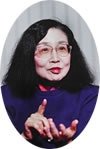Yayori Matsui (1934-2002)
 Matsui Yayori was born in Kyoto in 1934 and grew up in Tokyo, the eldest of six children of Christian ministers. As a high school student she contracted a severe case of tuberculosis and was bedridden for four years. Unable to graduate from high school, she nevertheless passed the University Qualification Exam after her recovery and was admitted to the Department of British and American Studies at Tokyo Gaikokugo Daigaku (Tokyo University of Foreign Studies). During her junior year, she left Japan to spend a year in America as an exchange student, and then went on to Europe, where she furthered her studies at the Sorbonne. On the journey home, she was shocked at the contrast between the poverty of Asia and the prosperity she had just seen in Europe and America. This first trip abroad, which gave her a new awareness of racial, ethnic, and sexual oppression, left her determined to change the inequalities of global society and to stand always with the weakest of its members.
Matsui Yayori was born in Kyoto in 1934 and grew up in Tokyo, the eldest of six children of Christian ministers. As a high school student she contracted a severe case of tuberculosis and was bedridden for four years. Unable to graduate from high school, she nevertheless passed the University Qualification Exam after her recovery and was admitted to the Department of British and American Studies at Tokyo Gaikokugo Daigaku (Tokyo University of Foreign Studies). During her junior year, she left Japan to spend a year in America as an exchange student, and then went on to Europe, where she furthered her studies at the Sorbonne. On the journey home, she was shocked at the contrast between the poverty of Asia and the prosperity she had just seen in Europe and America. This first trip abroad, which gave her a new awareness of racial, ethnic, and sexual oppression, left her determined to change the inequalities of global society and to stand always with the weakest of its members.
In 1961, Matsui began her career as a reporter for the Asahi Shimbun (newspaper). She covered public health and environmental issues, such as birth defects caused by Thalidomide and Minamata-byo (Minamata disease), a general term for the effects of mercury poisoning, so-called after the town in Kyushu where the first cases came to light. In addition, she tackled such contentious problems as Japan’s exportation of environmental pollution to other parts of Asia. After encountering the Women’s Liberation movement in America, she began to actively cover women’s issues, including the violation of women’s human rights through Japanese businessmen’s “sex tours” to other Asian nations, which led her to the problem of sexual violence against women in war and armed conflicts (the “comfort women” issue).
“As she speaks of the responsibility of not knowing anger reverberates in the woman writer’s voice” This tanka poem, published in the Asahi Shimbun in 1987, was written for Matsui, who was serving as Senior Staff Writer at the time. Supported by readers like the one who wrote this tanka, she had already become the first woman to serve as Tachikawa Bureau Chief and the Asahi Shimbun Asian General Bureau Correspondent. But whatever her title, she never lost sight of her true mission as a journalist―to bring to her readers the stories of those whose voices would otherwise go unheard.
After retiring from the Asahi Shimbun in 1994, she founded the Asia-Japan Women’s Resource Center (AJWRC), which became a home base for the further development of her activities both as a feminist and as an international journalist. In 1998, she organized Violence Against Women in War Network, Japan (VAWW-NET Japan) (currently known as Violence Against Women in War Research Action Center [VAWW RAC]), and in 2000, proposed the “Women’s International War Crimes Tribunal on Japan’s Military Sexual Slavery” as a final reckoning to end a century of war and violence. With the cooperation of women from Japan and throughout the world, the Tribunal became a reality.
In the fall of 2002, Matsui was told that she was suffering from liver cancer. She devoted the remaining four months of her life to writing her autobiography and realizing her plan for a “Women’s Museum of War and Peace” that would serve as a center to carry on the action she had begun. She died on December 27, 2002, leaving her entire estate to this Women’s Active Museum, which was built by the hands of the people and founded on the principles of Matsui Yayori’s life.
- New York Times: Yayori Matsui Dies at 68; Championed Asian Women By WOLFGANG SAXON Published: January 5, 2003
● Books by Yayori
- Women’s Asia (English Edition) : London: Zed Books. 1989
- Women in the New Asia: From Pain to Power
● Read articles by Yayori
- Japan Becoming a War State-Let Us Cry Out against War with Women around the World (2002)
- Women’s International War Crimes Tribunal on Japan’s Military Sexual Slavery – Success Brought by the Power of Women’s Transnational Solidality(2001)
- Women’s International War Crimes Tribunal on Japan’s Military Sexual Slavery – An NGO Attempt to Restore Justice for Victimized Women and to Prevent Future Wartime Violence against Women
The Women’s Human Rights Award and the Yayori Journalist Award
The Women’s Human Rights Activities Award (the Yayori Award) and the Yayori Journalist Award were created through the final will and funds of Yayori Matsui. The Yayori Award encourages women activists, journalists, and artists who work at the grassroots level with socially marginalized peoples in order to create a 21st century that is free from war and discrimination against women. The Yayori Journalist Award focuses on women journalists and artists (individuals or groups) who vividly describe and transmit the situation of women in the world with a gender perspective.
- Yayori Award/Women’s Human Rights Award Official website
